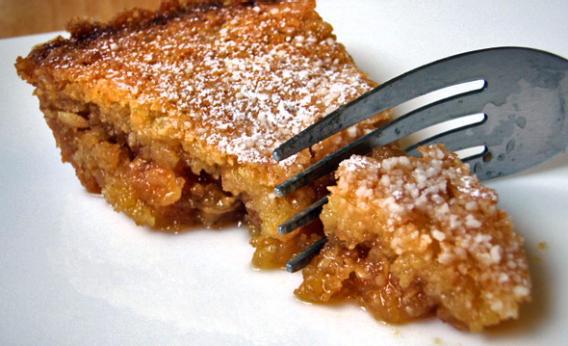Funny Song About Selling Marijuana Instead of Crack Because Crack Has Guns
No, Your Favorite Food Is Not Like Crack
So stop saying that.

Crack Pie from Momofuku Milk Bar is just like crack. Except it doesn't ruin lives.
Photo courtesy of joyosity/Flickr
This summer a despicable trend is extending its tentacles beyond the five boroughs of New York City. First, Momofuku Milk Bar, the New York pastry shop, opened a branch in Toronto. Then, Calexico, a Brooklyn-based taco joint, announced plans to expand to Philadelphia. Fans of corn cookies and Baja fish tacos might see these developments as a good thing. But Momofuku Milk Bar and Calexico are expanding the availability of more than inventive desserts and Cal-Mex. They're also colonizing new lands with a fad that's already exceeded the boundaries of good taste: selling food named after crack cocaine.
To be fair, people have been saying their favorite foods are "like crack" since long before Momofuku Milk Bar's sugary Crack Pie and Calexico's chipotle "crack" sauce made their debuts. Some of the earliest instances of the metaphor I could find in writing were on message boards in 2003 and 2004: Jokesters described breakfast burritos, barbecue sauce, and green chili salsa as having properties like those of the stimulant. Gradually the obnoxious phrase made its way into Yelp reviews and recipe comments. Soon yoga instructors and skateboarders were being quoted in print publications comparing Pinkberry frozen yogurt and Krispy Kreme doughnuts (respectively) to crack. After Momofuku introduced its Crack Pie in 2008, the phrase was adopted by mainstream food journalists like New York Times food columnist Melissa Clark (who thinks both the granola sold at an exorbitantly priced Park Slope food boutique and Annie's Cheddar Bunnies crackers are like crack.)
And Momofuku Milk Bar and Calexico aren't the only restaurants that have formalized the abhorrent metaphor on their menus. As New York magazine cataloged in its pages last year, "Now the mean streets of New York are rife with 'salted crack caramel' ice cream, 'pistachio crack' brittle, 'crack steak' sandwiches, and 'tuna on crack.' " After tasting all the foods in the city that proudly wore this mantle, New York deemed Ample Hills Creamery's salted crack caramel ice cream—a deep brown, obscenely rich frozen custard that sends Brooklynites queuing out the shop's door and around the block—the "crackiest crack food in town."
Saying that a food is "like crack"—or doing away with the "like" and using "crack" as an awkward adjective—is intended to be an edgy way of emphasizing how instantly gratifying it is, and how difficult it is to stop eating it once it's in front of you. Unfortunately, all it really does is demonstrate how out of touch and callously classist foodie culture has become.
Is a steak sandwich bad for your health? Absolutely. Does caramel ice cream taste so good that it induces cravings in some people? You bet. Do sweet, fatty foods like Crack Pie light up the same pleasure centers of the brain that are activated by addictive drugs? Sure—in rats, at least. And yet food is not like crack in several significant ways. None of the foods touted on menus as being like crack is illegal. None of them produces an intense, euphoric, consciousness-altering high when you eat it. None of them induces paranoia, psychosis, erratic behavior, or seizures when you consume too much of it over the course of a few days. None of them scars your lungs, making it difficult to breathe, if you make a habit of eating them over the long term. And none of these foods is so physically addictive that it has the potential to ruin your health, finances, and relationships.
Yes, I understand that comparing food to crack is supposed to be hyperbolically absurd, funny because it's exaggerated, a slightly more colorful way of saying that a food is habit-forming. (As B.R. Myers put it in his epic takedown of foodie-ism in the Atlantic a couple of years ago, "Hyperbole … remains the central comic weapon in the food writer's arsenal. It gets old fast.") The problem with the joke is that crack addiction isn't funny. The rise of crack cocaine's availability—and the brutal, racist war on drugs that ensued—tore inner-city communities apart in the 1980s and 1990s. And although sales of the drug aren't what they once were, gang violence associated with crack trafficking continues to make some urban neighborhoods nightmarishly unlivable. There is no quicker way to display your ignorance of and indifference to the misery of poverty in America than to say that your favorite dessert is "like crack."
How many people who smirk when they order a piece of Crack Pie have ever met anyone who smokes crack, let alone smoked it themselves? The social and economic chasm between the kind of people who buy $10 sundaes at Ample Hills Creamery and the kind of people who buy $10 crack rocks is impossible to ignore. Why don't foodies who wish to express the intense sensual appeal of a certain food compare it to a drug that they have some firsthand experience with, like alcohol, marijuana, or even powdered cocaine? Probably because it's obvious to anyone who's chugged beer, taken a hit of marijuana, or done a bump of cocaine that their effects are pleasurable in very different way from how food is pleasurable. Crack is the drug metaphor of choice among food worshipers precisely because it's alien to them. To someone who swoons over a "crack cookie," crack is an abstraction, a vague stand-in for "intense, addictive pleasure." These foodies never consider the fact that crack abuse is a devastating problem for some people, because they never have to.
Source: https://slate.com/human-interest/2013/08/food-like-crack-why-the-cocaine-metaphor-is-classist-and-insulting.html
0 Response to "Funny Song About Selling Marijuana Instead of Crack Because Crack Has Guns"
Postar um comentário